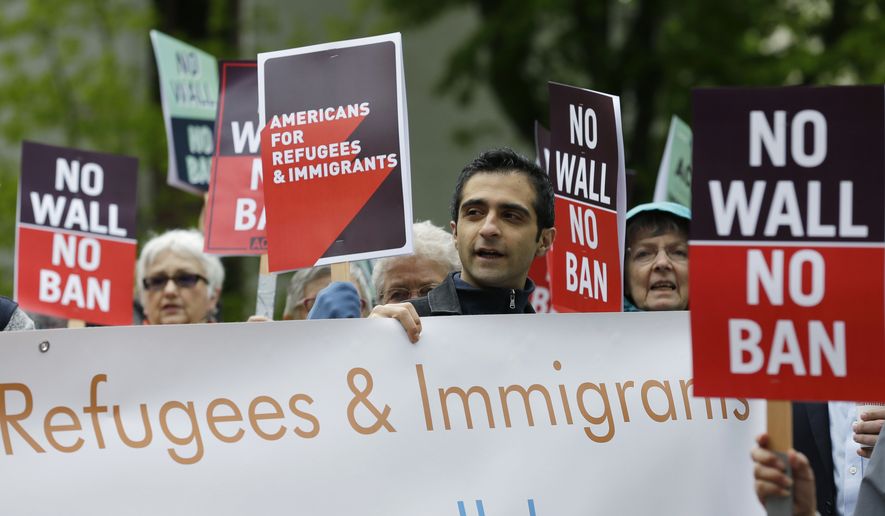A federal appeals court launched another assault on President Trump’s extreme vetting travel ban Monday, ruling that the White House never proved a connection between terrorism and the six majority-Muslim countries targeted by Mr. Trump.
The court also became the latest court to throw the president’s own words back at him — this time using Mr. Trump’s Twitter posts last week, saying the president’s claims of a travel ban aimed at “certain dangerous countries” prove he went beyond the law.
In a unanimous ruling, the three-judge panel of the 9th U.S. Circuit Court of Appeals said that while Mr. Trump claimed he was acting in the interests of national security, they found his reasoning lacking. Without a better justification, they said, his extreme vetting executive order is illegal.
The decision leaves in limbo Mr. Trump’s attempts to halt travel from the six countries and his pause on the refugee program.
But the appeals court did give the administration permission to take other steps to conduct an internal review of its vetting, carving some space out of a district judge’s near-total evisceration of the president’s March 6 executive order.
The entire issue is likely to be decided by the Supreme Court, which is speeding a similar case from an appeals court in Virginia that upheld a more narrow injunction on Mr. Trump’s plans.
White House press secretary Sean Spicer said he was confident that Mr. Trump would prevail in the high court, and he seemed to question the legal reasoning of the appellate judges.
“Any lawyer worth their salt 100 percent agrees the president’s fully within his rights,” Mr. Spicer said.
The ruling breaks new ground.
Other courts that have blocked the travel ban ruled that Mr. Trump showed animus toward Muslims during the presidential campaign and said that taints his case. They ruled that his policy violated the Constitution.
The 9th Circuit, however, said it didn’t need to get to that point. It ruled that Mr. Trump’s policies break immigration law, which makes them invalid.
According to the judges, the Immigration and Nationality Act does grant the president broad powers to determine whom to admit to the country, but if he is going to exclude a class of people, then he must make an official “finding” why admitting them would be detrimental to the U.S.
But the court said the administration hasn’t proved the dangers the U.S. faces by continuing to admit visitors from Iran, Libya, Somalia, Sudan, Syria and Yemen — the six countries Mr. Trump targeted for a 90-day halt.
The judges also said Mr. Trump in his executive order never justified his proposed 120-day pause in the U.S. refugee program.
“In short, the order does not provide a rationale explaining why permitting entry of nationals from the six designated countries under current protocols would be detrimental to the interests of the United States,” the judges said.
Indeed, the judges said, just 26 people from the six targeted countries have been convicted of terrorism offenses over the past 15 years. Nobody from the six countries has been implicated in any fatal attacks, the judges said.
The judges postulated a situation in which someone born in Syria but who moved to Switzerland as a child and has little connection with his home country could be barred, while someone born in Switzerland who went to train with the Islamic State in Syria as an adult wouldn’t be automatically barred by the policy.
Even more surprising, the judges said Mr. Trump was unable to cut the ceiling on the number of refugees admitted this year to 50,000, down from the 110,000 envisioned by President Obama. The court said Mr. Trump didn’t show why admitting the extra 60,000 refugees would be detrimental.
Attorney General Jeff Sessions said the 9th Circuit botched the case and that recent attacks elsewhere show the threat to the U.S. from the Islamic State and al Qaeda.
“The Executive Branch is entrusted with the responsibility to keep the country safe under Article II of the Constitution,” Mr. Sessions said. “Unfortunately, this injunction prevents the president from fully carrying out his Article II duties and has a chilling effect on security operations overall.”
Last week, Homeland Security Secretary John F. Kelly said there are concrete steps he wants to take but cannot because of the court rulings.
As the case heads to the Supreme Court, the legal arguments are sharpening.
Groups challenging Mr. Trump filed briefs urging the high court to keep the injunction in place.
They said despite Mr. Kelly’s insistence, the government has taken steps to tighten vetting, including additional questions the State Department asks visa applicants and imposing a ban on laptops and other large electronic devices on airplanes departing from 10 airports in Muslim-majority countries.
The groups, led by the American Civil Liberties Union and the International Refugee Assistance Project, urged the justices to take note of Mr. Trump’s tweets last week, when he complained that his attorneys were botching the case and said he wished they instead had defended his January executive order rather than the “watered down, politically correct” version he issued in March.
The 9th Circuit also took note of the president’s Twitter postings last week — particularly one in which he defended his policy as a “travel ban” aimed at “certain dangerous countries.”
The judges said that made clear Mr. Trump was singling out nations, rather than individuals — making it a violation of law.
• Stephen Dinan can be reached at sdinan@washingtontimes.com.




Please read our comment policy before commenting.